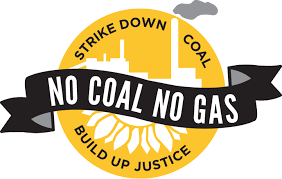From an Article by Julia Conley, Common Dreams, May 16, 2022
After being sentenced to four to six months in a county jail and thousands of dollars in fines for participating in a coal train blockade in New Hampshire more than two years ago, four climate campaigners say they will be “undeterred by these sentences” and will continue to fight the use of fossil fuels by powerful profit-driven corporations.
The activists are members of the grassroots No Coal, No Gas campaign in New England, which organized a blockade of a train that was shipping 10,000 tons of coal to Merrimack Station power plant in Bow, New Hampshire in December 2019.
Convicted of criminal trespass and railroad trespass, Dana Dwinell-Yardley and Daniel Flynn were sentenced Friday to four months in a county jail while Johnny Sanchez and Jonathan O’Hara were sentenced to six months. They were also ordered to pay more than $6,200 to PanAm Railways in restitution and fines totaling $5,580.
The campaign halted the train at three different locations, delaying the shipment by several hours. Prosecutors focused largely on the fact that the No Coal, No Gas campaign is part of a larger climate justice movement, while Judge Andrew Schulman of the Merrimack County Superior Court did not allow the defense to present evidence explaining the campaign and the history and efficacy of other social movements.
“These defendants are part of a movement,” said defense attorney Logan Perkins at the sentencing, which followed a three-day jury trial in March. “[That fact] is significant and we would have welcomed the opportunity to tell you more about the significance of that in a competing harms hearing, or in a competing harms defense presentation in which we would have been permitted to discuss how the science of social change has clearly identified the power of nonviolent social movements to effect change where all other approaches fail. We asked permission to share this and were denied.” Also, “If a self-proclaimed sympathetic judge can’t look beyond the status quo and the absolute protection of the industries that are actively endangering all of our futures, then we are in dire straits.”
During the trial in March, Perkins and the judge disagreed over the relevance of other social movements including the fight for civil and voting rights from Black Americans, with Schulman claiming that nonviolent action like the train blockade was not warranted as a response to the climate emergency and the continued use of coal at Merrimack Station—the last coal-fired power plant in New England.
Jonathan O’Hara has said that he and his co-defendants and supporters would be undeterred by Schulman’s decision. “It’s this fortitude and grounding in a sense of justice and rightness that will power us to continue to do what must be done,” he said.
O’Hara says he was not surprised by the judge’s sentence, which he called “absolutely clarifying about the state of climate action in the country.” Also, “I came here today hoping for justice, but not expecting justice, and I got what I expected,” said O’Hara. “If a self-proclaimed sympathetic judge can’t look beyond the status quo and the absolute protection of the industries that are actively endangering all of our futures, then we are in dire straits.”
The defendants spoke at the sentencing about the effects Merrimack Station has on its community. Noting that in one hour of burning coal, Merrimack Station emits as much carbon as the average American does in 26 years, Sanchez asked the judge, “Does justice look like allowing coal to still be burned in New England when we know the consequences? When we know that it contributes to higher rates of lung disease? Cardiac disease? To cancer? When we know it contributes to rapidly increasing global temperatures? To food insecurity? To fires?” Also, “That is why, back in December of 2019, I believed, as I do right now, that every second that we stopped those trains from delivering thousands of tons of harmful and unnecessary coal was my moral obligation,” he said.
Rev. Kendra Ford, a Unitarian Universalist minister and member of No Coal, No Gas, said the sentence reflects how “our legal system doesn’t seem to be able to respond to current circumstances.” Also, “The urgency of climate collapse is terrifying, and yet the court’s decisions today is focused on protecting profits for companies in the fossil fuel industry,” Ford said. “The judge seemed more concerned that these non-violent activists disrupted profits than the fact that the continued use of coal is causing irreparable harm to the planet.”

